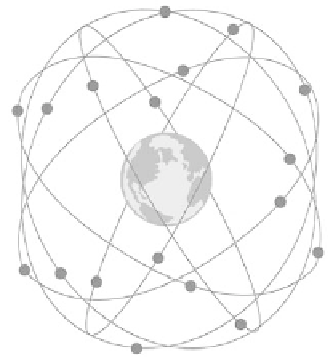Geography Reference
In-Depth Information
GPS navigation system built in as an
integral part of a car's dashboard.
ken, making it easier for the driver to remain concentrated on his or her
driving. The navigation systems generally work well, but can become a bit
nagging when the computerized voice incessantly rattles off the changing
names of streets and twists in a road. Other applications—for example, navi-
gation systems for visually impaired people—point to the many potentials.
Because of its ubiquity and importance for so many different activities,
the term GPS, which refers to only the U.S. funded satellite-based position-
finding system, is slowly being replaced by the term “global navigation satel-
lite system” (GNSS), which is the broader term. Because the only other
GNSS are currently under development (Galileo) or of limited and special-
ized use (GLONASS), this topic uses the term GPS, although in a few years,
as these other systems become more operational, GNSS will certainly find
wide usage.
WHAT IS GPS?
The Global Positioning System (GPS) is a system of satellites launched and
maintained by the U.S. Department of Defense. (They refer to GPS as
Idealized drawing of GPS satellites in
orbit.
From Campbell (2007), p. 379. Reprinted by permission
of Guilford Publications.








Search WWH ::

Custom Search